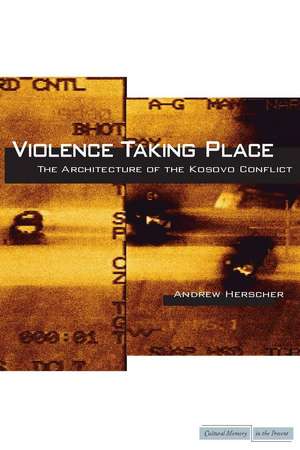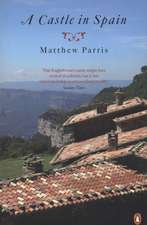Violence Taking Place: The Architecture of the Kosovo Conflict: Cultural Memory in the Present
Autor Andrew Herscheren Limba Engleză Hardback – 24 mar 2010
While the construction of architecture has a place in architectural discourse, its destruction, generally seen as incompatible with the very idea of "culture," has been neglected in theoretical and historical discussion. Responding to this neglect, Herscher examines the case of the former Yugoslavia and in particular, Kosovo, where targeting architecture has been a prominent dimension of political violence. Rather than interpreting violence against architecture as a mere representation of "deeper" social, political, or ideological dynamics, Herscher reveals it to be a form of cultural production, irreducible to its contexts and formative of the identities and agencies that seemingly bear on it as causes. Focusing on the particular sites where violence is inflicted and where its subjects and objects are articulated, the book traces the intersection of violence and architecture from socialist modernization, through ethnic and nationalist conflict, to postwar reconstruction.
Toate formatele și edițiile
| Toate formatele și edițiile | Preț | Express |
|---|---|---|
| Paperback (1) | 153.80 lei 22-36 zile | |
| Stanford University Press – 24 mar 2010 | 153.80 lei 22-36 zile | |
| Hardback (1) | 587.65 lei 43-57 zile | |
| Stanford University Press – 24 mar 2010 | 587.65 lei 43-57 zile |
Din seria Cultural Memory in the Present
-
 Preț: 173.10 lei
Preț: 173.10 lei -
 Preț: 197.12 lei
Preț: 197.12 lei -
 Preț: 365.56 lei
Preț: 365.56 lei -
 Preț: 193.14 lei
Preț: 193.14 lei -
 Preț: 194.26 lei
Preț: 194.26 lei -
 Preț: 155.84 lei
Preț: 155.84 lei -
 Preț: 155.89 lei
Preț: 155.89 lei -
 Preț: 149.68 lei
Preț: 149.68 lei -
 Preț: 211.98 lei
Preț: 211.98 lei -
 Preț: 228.62 lei
Preț: 228.62 lei -
 Preț: 206.94 lei
Preț: 206.94 lei -
 Preț: 209.36 lei
Preț: 209.36 lei -
 Preț: 193.58 lei
Preț: 193.58 lei -
 Preț: 156.25 lei
Preț: 156.25 lei -
 Preț: 146.22 lei
Preț: 146.22 lei -
 Preț: 171.47 lei
Preț: 171.47 lei -
 Preț: 194.45 lei
Preț: 194.45 lei -
 Preț: 229.26 lei
Preț: 229.26 lei -
 Preț: 296.64 lei
Preț: 296.64 lei -
 Preț: 210.24 lei
Preț: 210.24 lei -
 Preț: 228.62 lei
Preț: 228.62 lei -
 Preț: 278.31 lei
Preț: 278.31 lei -
 Preț: 298.62 lei
Preț: 298.62 lei -
 Preț: 153.16 lei
Preț: 153.16 lei -
 Preț: 193.58 lei
Preț: 193.58 lei -
 Preț: 204.76 lei
Preț: 204.76 lei -
 Preț: 228.39 lei
Preț: 228.39 lei -
 Preț: 139.64 lei
Preț: 139.64 lei -
 Preț: 243.46 lei
Preț: 243.46 lei -
 Preț: 201.90 lei
Preț: 201.90 lei -
 Preț: 152.36 lei
Preț: 152.36 lei -
 Preț: 226.40 lei
Preț: 226.40 lei -
 Preț: 169.59 lei
Preț: 169.59 lei -
 Preț: 197.12 lei
Preț: 197.12 lei -
 Preț: 194.88 lei
Preț: 194.88 lei -
 Preț: 170.65 lei
Preț: 170.65 lei -
 Preț: 194.45 lei
Preț: 194.45 lei -
 Preț: 151.12 lei
Preț: 151.12 lei -
 Preț: 194.01 lei
Preț: 194.01 lei -
 Preț: 194.45 lei
Preț: 194.45 lei -
 Preț: 208.06 lei
Preț: 208.06 lei -
 Preț: 196.69 lei
Preț: 196.69 lei -
 Preț: 142.73 lei
Preț: 142.73 lei -
 Preț: 466.14 lei
Preț: 466.14 lei -
 Preț: 167.15 lei
Preț: 167.15 lei -
 Preț: 194.45 lei
Preț: 194.45 lei -
 Preț: 173.51 lei
Preț: 173.51 lei -
 Preț: 232.11 lei
Preț: 232.11 lei -
 Preț: 207.13 lei
Preț: 207.13 lei -
 Preț: 150.09 lei
Preț: 150.09 lei
Preț: 587.65 lei
Preț vechi: 725.50 lei
-19% Nou
Puncte Express: 881
Preț estimativ în valută:
112.48€ • 122.22$ • 94.55£
112.48€ • 122.22$ • 94.55£
Carte tipărită la comandă
Livrare economică 21 aprilie-05 mai
Preluare comenzi: 021 569.72.76
Specificații
ISBN-13: 9780804769358
ISBN-10: 0804769354
Pagini: 224
Dimensiuni: 152 x 229 x 23 mm
Greutate: 0.45 kg
Ediția:1
Editura: Stanford University Press
Colecția Stanford University Press
Seria Cultural Memory in the Present
ISBN-10: 0804769354
Pagini: 224
Dimensiuni: 152 x 229 x 23 mm
Greutate: 0.45 kg
Ediția:1
Editura: Stanford University Press
Colecția Stanford University Press
Seria Cultural Memory in the Present
Recenzii
"Overall, the book Violence Taking Place: The Architecture of the Kosvo Conflict is a thoughtful and detailed study of the complex relationships between architecture and violence. It provides an insightful view of the specifics of the Kosvo conflict and the broader context needed in our attempts to understand the war in former Yugoslavia."—Dijana Alic, International Journal of Islamic Architecture
"Andrew Herscher's precise and meticulously researched book, Violence Taking Place, argues that not only is architectural destruction a symbol of violence but also that architecture forms a necessary context for violence to take place . . . Violence Taking Place represents the first architectural history of political violence in relation to historical preservation, and in doing so suggests a new area of concern for critical heritage studies. This is an important book that deserves to be read widely by those working in the field of historic preservation."—Rodney Harrison, Future Anterior
"An incredible description of the relations between architecture, politics and human rights. The text and narrative are painfully beautiful."—Malkit Shoshan, Architect, The Foundation for Achieving Seamless Territory, Amsterdam, The Netherlands, Abitare: International Design Magazine
"This book offers an extraordinary contribution to the existing interdisciplinary scholarship around the Yugoslav wars (and the nature of what is termed 'ethnic violence' more generally) on the one hand, and to work that explores the place of architecture in peace and conflict studies on the other. The author insists on architecture's role in making identities, marshaling a nuanced understanding of the Kosovo experience to explore broader, more theoretical themes in a way that is uniquely compelling."—Sari Wastell, Goldsmiths, University of London
"In this painstakingly researched study of the destruction and reconstruction of Kosovo's culturescape, Andrew Herscher brilliantly defamiliarizes received wisdom concerning the relation between monuments and war in general. Keeping his eye on the specificity of this particular environment and on the general characteristics of contemporary conflict at once, Herscher interprellates between what is unique and what is, tragically, all-too-common in the 'urbicides' of the present geopolitical order. This is a work that will inform and challenge anyone with an interest in the dynamics of contemporary conflict and in the new transnational cultures of reconstruction."—Daniel Bertrand Monk, Colgate University
Notă biografică
Andrew Herscher is Assistant Professor of Architecture at the University of Michigan. He investigated wartime destruction for the International Criminal Tribunal for the former Yugoslavia, was co-director of the Department of Culture of the United Nations Mission in Kosovo, and founded the Kosovo Cultural Heritage Project.
Descriere
The first history ever of violence against architecture as political violence, this book examines the case of the former Yugoslavia and the ways in which architecture is a site where power, agency, and ethnicity are constituted.






